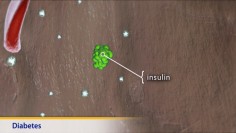
Diabetes: Bedtime Snacks
Bedtime snacks are important for blood sugar control for children with diabetes who use insulin. A snack that includes carbohydrate and protein helps to keep up your child's blood sugar level through the night. A typical bedtime snack should include 15 grams of carbohydrate and 7 to 8 grams of protein. This amount can change based on your child's age, blood sugar levels, and activity throughout the day.
Examples of foods containing 15 to 30 grams of carbohydrate and 7 to 8 grams of protein include:
15 gram carbohydrate snacks:
- 1 6-inch corn tortilla plus 1/4 cup grated cheese.
- 1 6-inch flour tortilla with 1 scrambled egg or 1 ounce lean meat.
- 6 whole wheat crackers plus 1 string cheese.
- 1 cup chopped fresh fruit with 1/4 cup cottage cheese.
- 6 to 8 ounces of no-sugar-added yogurt*.
- 12 small pretzels plus 2 Tbsp sunflower seeds.
30 gram carbohydrate snacks:
- 1/2 cup beans on 6 inch tortilla.
- 3/4 to 1 cup dry low sugar cereal plus 1/4 cup peanuts.
- 1 1/2 slices of whole wheat bread plus 2 Tbsp peanut butter.
- 5 vanilla wafers plus 1 cup low fat milk*.
- 3 cups popcorn plus 1/4 cups almonds.
*Yogurt and milk provide about 15 grams of carbohydrate as well as protein.
Adjust carbohydrate amounts based on what the blood sugar is at bedtime. Here are some guidelines to follow:
At bedtime, if your child's blood sugar is:
- 150-200 mg/dl (8.3-11.1 mmol/L): Give your child 15 to 20 grams of carbohydrate and 7 to 8 grams of protein.
- 100-150 mg/dl (5.5-8.3 mmol/L): Give your child 25 to 30 grams of carbohydrate and 7 to 8 grams of protein.
- 100 mg/dl (5.5 mmol/L): Give your child 30 to 45 grams of carbohydrate and 7 to 8 grams of protein.
Children who have had an active day should have a bedtime snack no matter what their blood sugar level. Ask your healthcare provider for more specific information.
Last modified: 2011-06-08
Last reviewed: 2011-06-07

